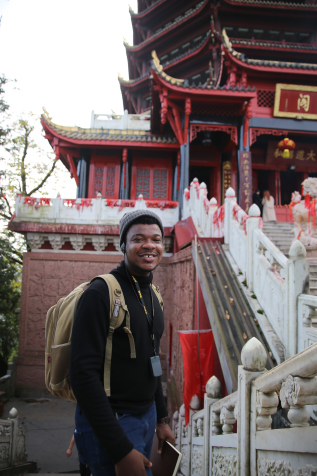| Features |
| Chinese movies are a huge form of soft power in Nigeria and are increasingly popular in Nigeria | |
| Although the relationship between China and Nigeria focuses on bilateral trade, technological exchanges and partnership in space and telecommunication programs, there are other indices too | |
|
|
 (COURTESY PHOTO)
Although the relationship between China and Nigeria focuses on bilateral trade, technological exchanges and partnership in space and telecommunication programs, there are other indices too. These include Chinese literature, cuisine, clothes and of course, Chinese movies. Perceived by Nigerians as a good source of entertainment, Chinese movies are a huge form of soft power in Nigeria and are increasingly popular in Nigeria, along with Chinese stars. I have enjoyed watching films like Dragon Blade, the 2015 historical action drama about how a team of Chinese and Roman heroes foil the invasion by a corrupt Roman leader, Snake in the Eagle's Shadow, the Jackie Chan-starring transformational story about a bullied student at a kungfu school becoming a master of the art, and many others. Most of these movies starred some of my personal favorite Chinese actors like Chan, Jet Li and Donnie Yen Ji-dan. The aesthetic fighting styles made my childhood fun. While writing this, I reminisced how I would find myself "practicing" the moves and vocal sounds I could remember after seeing an interesting Jackie Chan movie. In fact, before moving to China, I admired (and still do) how the Chinese actors were able to "fly" high and long distances in their movies, thinking it was real. Martial art movies are so popular in Nigeria that once the average Nigerian sees any movie with kungfu scenes, they immediately say it is a "Chinese film" even if it is not. In fact, I still find myself making this mistake over and over again. Sometimes when I watch Hollywood films featuring Chinese actors, I erroneously consider them to be Chinese movies. In Nigeria, just as football is synonymous with Brazil, the Chinese movie industry has so permeated the Nigerian market that martial art is considered synonymous with China. Drawing a lot from China's rich cultural history, this soft power mechanism, I would say, impacts the movie industry in Nigeria to an extent. Every year, there is an increasing number of traditional Nigerian films released by Nigeria's movie industry Nollywood. This is not surprising since both countries share similar characteristics. They are both multi-ethnic and multilingual, they both have large populations and are huge players in their regions. I first heard Mandarin in Snake in the Eagle's Shadow. Ever since, I have been fascinated by the language, usually finding myself mimicking what I could hear and remember. This is not my case alone. There are numerous cases in Nigeria where average Nigerians, movie stars and comedians with zero Chinese-language proficiency "speak" Chinese. We don't do this to mock the language or the people but for entertainment and commercial purposes. For me, this foreshadows the emphasis on maintaining language, cultural values and narratives. Another very interesting element of the Chinese movie industry is the exposure to noodles and chopsticks. Pasta and pizza are popular Western food in Nigeria but owing largely to movies and the increased influx of Chinese into Nigeria, noodles have become a household name. In fact, the most popular brand is Indomie, an instant noodles manufactured by an Indonesian company. The brand is so popular that the word noodles has been replaced with Indomie, thereby technically kicking competitors out of the market. I was exposed to Chinese culture through movies, one of its most popular, entertaining and powerful sources. I have learned certain things about China just from watching Chinese films, which is not peculiar to me alone. In fact, this knowledge, blended with college education, has metamorphosed into a research passion. This is one reason I am here in China, to live the dream. I have to add that I still enjoy the thought that Chinese martial art actors have superhuman powers to fly across buildings with blistering speed and for great lengths. It reminds me of the koi fish myth which too I learned from a Chinese movie. According to legend, there was a torrential waterfall on the Yellow River. On top of it stood a magical Dragon Gate. It was impossible to swim up the waterfall but the koi that succeeded in passing through the gate became a dragon. Or in other words, a symbolic lesson about the power of courage and perseverance. The author is a Yenching Academy scholar at Peking University from Nigeria (Print Edition Title: When Fish Becomes Dragon) Copyeditied by Sudeshna Sarkar Comments to dingying@bjreview.com |
|
||||||||||||||||||||||||||||
|
